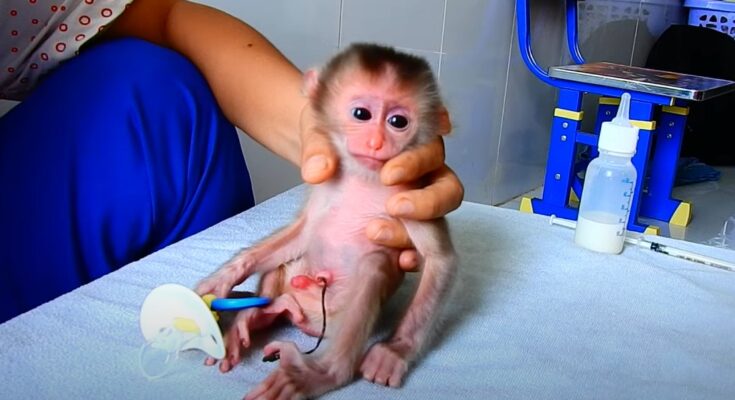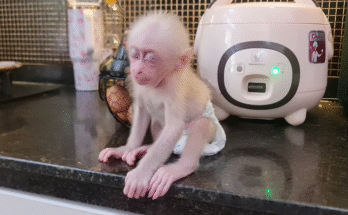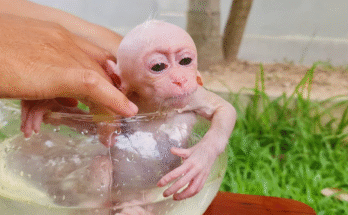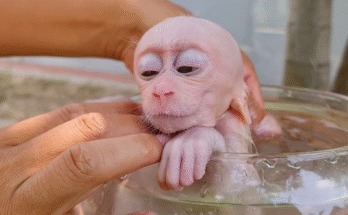In the heart of the jungle, a fragile newborn monkey fights for survival. Born into challenging conditions, its tiny cries echo through the trees, pulling at the heartstrings of those who witness its struggle. With its delicate frame and helpless gaze, the baby monkey depends entirely on the compassion and care of its family to endure the harsh environment. This touching story is a powerful reminder of the resilience of life and the importance of empathy. Viewers are left captivated by the raw emotions of the little fighter’s journey, making this tale an unforgettable glimpse into the beauty and fragility of nature.
How to Care for a Newborn Monkey at Home
Caring for a newborn monkey at home is both a rewarding and challenging responsibility. These delicate creatures require specialized care to ensure their healthy growth and development. This guide will cover essential aspects of providing proper care for a newborn monkey, helping you create an environment where they can thrive.
1. Create a Safe and Comfortable Environment
Newborn monkeys are highly vulnerable to environmental changes. Start by setting up a warm, secure, and clean space for them. Use a soft blanket-lined incubator or a small enclosure that maintains a stable temperature between 85–90°F. Ensure the space is free from sharp objects and potential hazards.
To mimic their natural environment, provide a small stuffed toy or cloth to offer comfort and simulate their mother’s presence. Regularly clean the enclosure to avoid infections.
2. Provide Proper Nutrition
Feeding is crucial for the growth of a newborn monkey. Purchase a high-quality primate milk formula, as cow’s milk can cause digestive issues. Use a sterilized baby bottle or syringe to feed them every 2–3 hours, including during the night. Always warm the milk to body temperature before feeding and hold the monkey securely to ensure they feel safe.
Gradually adjust feeding intervals and introduce solid foods like mashed fruits or vegetables as they grow older. Consult with a veterinarian to determine the right feeding schedule and dietary supplements.
3. Maintain Hygiene
Hygiene is essential to prevent infections. Sterilize feeding equipment after each use and clean their enclosure daily. Use baby wipes or a damp, soft cloth to clean their skin if they become dirty, and ensure they are thoroughly dried afterward.
Newborn monkeys often require assistance with urination and defecation. Gently rub their abdomen and genital area with a damp cotton ball to stimulate these processes, mimicking their mother’s care.
4. Monitor Health and Growth
Newborn monkeys are prone to illnesses, so regular health monitoring is vital. Observe their behavior, weight gain, and energy levels closely. Signs of dehydration, lethargy, or poor appetite require immediate veterinary attention.
Schedule regular check-ups with an exotic animal veterinarian experienced in primates. Keep up-to-date with necessary vaccinations and discuss any health concerns promptly.
5. Provide Social Interaction
Monkeys are highly social animals and thrive on interaction. Spend quality time with your monkey to build trust and emotional security. Gently hold and talk to them, mimicking the comfort they would receive from their mother.
If possible, introduce them to other monkeys or suitable playmates as they grow older to encourage natural social behaviors. Always supervise interactions to ensure safety.
6. Understand Legal and Ethical Responsibilities
Before bringing a newborn monkey home, ensure compliance with local laws and regulations regarding primate ownership. Monkeys are exotic animals, and owning one comes with significant ethical responsibilities. Consider their long-term needs and whether you can provide lifelong care.
7. Prepare for Long-Term Commitment
Newborn monkeys grow quickly and develop complex needs. They require mental stimulation, a balanced diet, and consistent care throughout their lives. Invest in toys, climbing structures, and other enrichment tools to keep them engaged and healthy.
Additionally, educate yourself continuously about monkey care through books, online resources, and consultations with experts.
Conclusion
Caring for a newborn monkey at home is a lifelong commitment that demands time, effort, and resources. By providing a safe environment, proper nutrition, social interaction, and regular medical care, you can ensure the well-being of your little companion. Always prioritize their health and happiness, and remember that responsible ownership is key to a fulfilling relationship with your monkey.
Falling Down, but Not Out: Baby Resilient Spirit
Caring for a newborn monkey requires patience, knowledge, and dedication. Start by providing a warm, safe environment that mimics the comfort of their natural habitat. Feed them an appropriate diet, such as specially formulated milk or a veterinarian-recommended substitute, every 2–3 hours. Hygiene is essential—clean feeding bottles thoroughly and maintain a sanitary space. Gentle handling helps them feel secure and loved. Regular checkups with a vet are crucial for monitoring their health. Bonding through physical closeness promotes trust and emotional well-being. Proper care not only ensures their survival but also builds a strong, lasting relationship.
Essential Points to Understand About Caring for a Newborn Monkey
Caring for a newborn monkey is a delicate task that requires attention to detail, patience, and a deep understanding of their unique needs. These primates share many similarities with humans, but their care is specific to their species. Here are the key points you need to know to ensure the well-being of a newborn monkey:
1. Creating a Safe and Comfortable Environment
A newborn monkey requires a warm, secure space that mimics the natural conditions they would experience with their mother. Use soft blankets or towels to create a cozy nest, ensuring it is free from hazards like sharp objects or loose threads. Maintain a temperature between 85–90°F (29–32°C) to keep them comfortable, especially in the first few weeks.
2. Proper Nutrition
Feeding a newborn monkey requires careful attention. Consult a veterinarian to identify the best milk formula for their specific species, as cow’s milk is often unsuitable and can cause digestive issues. Feedings should occur every 2–3 hours, using sterilized bottles to prevent infections. Gradually introduce small amounts of mashed fruits or baby food as they grow, ensuring their diet meets their developmental needs.
3. Maintaining Hygiene
Cleanliness is critical for newborn monkeys, as they are highly susceptible to infections. Wash your hands before handling them and sterilize feeding equipment after each use. Clean their living area regularly and dispose of waste promptly to avoid attracting pests.
4. Health Monitoring
Newborn monkeys are vulnerable to various health issues. Regular veterinary checkups are essential to monitor their growth and address potential problems early. Watch for signs of illness, such as lethargy, lack of appetite, or abnormal stools, and seek immediate medical attention if these occur.
5. Emotional Bonding and Socialization
Newborn monkeys thrive on physical and emotional connection. Mimic the nurturing care of a mother by holding them close, stroking their fur, and speaking in soothing tones. This builds trust and emotional security. As they grow, gradually introduce them to other monkeys or companions to encourage healthy social behaviors.
6. Establishing a Routine
Monkeys, like humans, benefit from consistent routines. Set regular times for feeding, cleaning, and play to help them feel secure and reduce stress. A predictable schedule promotes better overall health and behavior.
7. Understanding Legal and Ethical Responsibilities
Caring for a newborn monkey comes with legal and ethical obligations. Ensure that you are complying with local regulations regarding primate ownership. Always prioritize the monkey’s welfare and consider their long-term needs, as they require years of commitment and care.
8. Enrichment and Mental Stimulation
Monkeys are intelligent and curious animals. Provide toys, climbing structures, and interactive activities to stimulate their minds and prevent boredom. Simple items like ropes, mirrors, and puzzle feeders can keep them engaged and promote natural behaviors.
9. Preparing for Growth and Development
Newborn monkeys grow quickly, and their needs change over time. Stay informed about their developmental milestones and adjust their diet, environment, and enrichment accordingly. Consulting with primate experts or joining forums can provide valuable guidance.
10. Building a Support Network
Caring for a newborn monkey can be challenging, especially for first-time caregivers. Connect with other primate owners, rescue organizations, or veterinarians experienced with monkeys to share advice and support. Online communities can be an invaluable resource for troubleshooting issues and gaining insights.
Final Thoughts
Caring for a newborn monkey is a rewarding yet demanding responsibility. By understanding their physical, emotional, and social needs, you can ensure their healthy development and happiness. Always prioritize their well-being and seek professional advice when needed. With dedication and love, you can provide the nurturing care they need to thrive.



